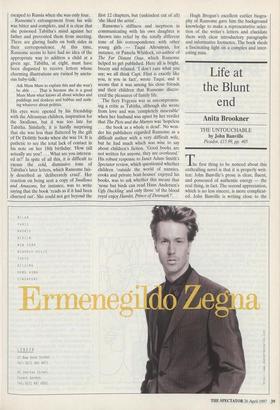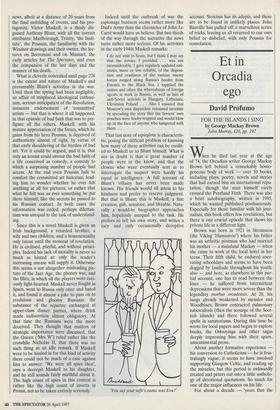Life at the Blunt end
Anita Brookner
THE UNTOUCHABLE by John Banville Picador, £15.99, pp. 405 he first thing to be noticed about this enthralling novel is that it is properly writ- ten: John Banville's prose is clear, fluent, and possessed of authentic energy — the real thing, in fact. The second appreciation, which is no less sincere, is more complicat- ed. John Banville is writing close to the news, albeit at a distance of 20 years from the final unfolding of events, and his pro- tagonist, Victor Maskell, is a thinly dis- guised Anthony Blunt, with all the correct attributes: Marlborough, Trinity, `the Insti- tute', the Poussin, the familiarity with the Windsor drawings and their owner, the lec- tures on Borromini and on Mansart, the early articles for The Spectator, and even the companion of the last days and the manner of his death.
What is cleverly concealed until page 278 is the extent and nature of Maskell's and presumably Blunt's activities in the war. Until then the spying had been negligible, an affair of misplaced ideological enthusi- asm, serious anticipation of the Revolution, insincere endorsement of 'committed' artists — but that is where it all happened, in that episode of bad faith that was to pre- figure all the others. Maskell, with his mature appreciation of the Stoics, which he gains from his hero Poussin, is deprived of authenticity almost of right, by virtue of that early shouldering of the burden of bad art. Yet it could be argued, and it is, that only an ironist could savour the bad faith of a life conceived as comedy, a comedy to which a surprising number of people had access. At the end even Poussin fails to comfort the committed art historian, lead- ing him to wonder whether he ever felt anything at all for pictures, or rather that what he felt was as ever something he put there himself, like the secrets he passed to his Russian contact. In both cases the information was coded: perhaps dilettan- tism was unequal to the task of understand- ing.
Since this is a novel Maskell is given an Irish background, a retarded brother, a wife and two children, and a homosexuality only latent until the moment of revelation. He is civilised, playful, and without princi- ples. Indeed his lack of morality is never so much as hinted at: only the reader's increasing unease will supply it. Otherwise this seems a not altogether misleading pic- ture of the Jazz Age, the phoney war, and the Blitz, in which all the players were curi- ously light-hearted. Maskell never fought in Spain, went to Russia only once and hated it, and found it almost a joke to pass on to credulous and gloomy Russians the substance of the repartee exchanged at upper-class dinner parties, where drink made indiscretion almost obligatory. At that time the Russians were the more deceived. They thought that matters of strategic importance were discussed, that the Queen (`Mrs W') ruled rather like the erstwhile Nicholas II, that there was no such thing as an idle remark. If Maskell were to be hauled in for this kind of activity there could not be much of a case against him to answer. 'We were all spies then', says a decrepit Maskell to his daughter, and he still sounds fairly mirthful about it. The high count of spies in this context is rather like the high count of inverts in Proust, not to be taken entirely seriously. Indeed until the outbreak of war the espionage business seems rather more like Dad's Army than the chronicles of John Le Carre would have us believe. But two thirds of the way through the narrative the news turns rather more serious. Of his activities in the early 1940s Maskell remarks: I do not wish to boast, but I think I may say that the service I provided .. . was not inconsiderable. I gave regularly updated esti- mates, more or less reliable, of the disposi- tion and readiness of the various enemy forces ranged along Russia's border from Estonia to the Black Sea. I supplied the names and often the whereabouts of foreign agents at work in Russia, as well as lists of anti-Soviet activists in Hungary, Lithuania, Ukrainian Poland . . . Also I ensured that Moscow's own dispatches remained inviolate by spreading the story that the Soviets' own pouches were booby-trapped and would blow up in the face of anyone who tampered with them ...
That last note of espieglerie is characteris- tic, posing the difficult problem of knowing how many of these activities can be credit- ed to Maskell or to Blunt himself. What is not in doubt is that a great number of people were in the know, and that the clowns who were eventually sent in to interrogate the suspect were hardly his equal in intelligence. A full account of Blunt's villainy has never been made known. His friends would all attest to his kindness and prefer to reserve judgment. But that is Blunt; this is Maskell, a fine creation, glib, sensitive, and likeable. Natu- rally a would-be biographer approaches him, hopelessly unequal to the task. He prefers to tell his own story, and writes a racy and only occasionally deceptive You say your wife's name was Eva?' account. Stoicism has its adepts, and these are to be found in unlikely places. John Banville has pulled off a marvellous series of tricks, leaving us all returned to our own belief or disbelief, with only Poussin for consolation.



































































 Previous page
Previous page